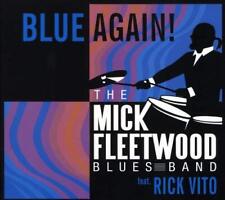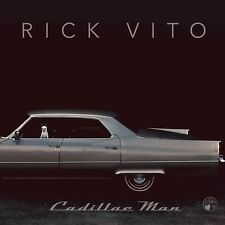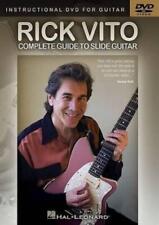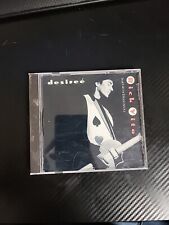Oct 17, 2009
NZ Listener
“Mr Fleetwood is in the building!”, announces a man in a mid-Atlantic accent, like a master of ceremonies hyping the crowd for a headline act. But it is not showtime; it is mid-afternoon, New Zealand time, and the speaker, who has not introduced himself, is killing time on one end of the phone as I stand by at the other for my allocated twenty minutes with Mick Fleetwood, drummer and founding member of Fleetwood Mac.
Another voice, laughing jovially, seems to confirm that Mr Fleetwood is indeed in the building, and not far from the phone. “Would you like a sandwich?” I hear the mid-Atlantic voice ask, and the English reply: “Yes, please, and a banana”. “We’re having a protein break”, Mr Mid-Atlantic explains to me. Mr Fleetwood, is on the island of Maui, Hawaii.
An image forms of the six-foot-six star reclining in a hammock slung between two palm trees, while an attendant fans him with a frond.
The minder is back on the line and the show-biz build-up begins again. “The next voice you hear will be the legend, the man”, he promises. But while I wait, he makes further conversation. “So how’s the weather in Australia? Is it summer or winter?”
I’m in New Zealand, I say, adding that the venue for Fleetwood Mac’s first appearances here in 29 years – New Plymouth’s Bowl Of Brooklands – is beautiful and should contribute to an enjoyable concert. “Oh yes, is that in the Hunter Valley there?”
At last, out of the Hawaiian sunshine, comes a languid lordly "Hello!" “So, you’re in Hawaii at the moment?” I ask rhetorically, not yet certain that I have Fleetwood on the line. “No”, the legend replies pedantically. “I live in Hawaii, so ‘at the moment’ is the moment”. Ah, right. Such peculiar statements, tinged with a kind of non-sectarian mysticism, are typical, I soon discover. Fleetwood’s answers tend to be long and eccentrically structured, and frequently begin with “In truth…”
At the height of their success, Fleetwood Mac had the biggest selling album ever, an achievement that was eventually surpassed by a couple of soundtracks (Saturday Night Fever and Grease) and Michael Jackson’s Thriller. Rumours remains one of the all-time top ten-selling records, estimated to have sold around 40 million copies. No one sells that many discs these days, nor does it seem likely that anyone ever will again.
This year, Fleetwood Mac launched a world tour – The Unleashed Tour – that has so far seen them performing more than 60 concerts across Canada and the US. By the time they reach New Zealand just before Christmas, they will have played a further 20 or more dates in Europe.
Significantly, it is the first time they have toured without a new album to promote. Their last tour followed the release of 2003’s Say You Will, the album that reunited four-fifths of the Rumours line-up after a long break. Only Christine McVie, put off by prospect of a gruelling travel and promotion schedule, declined to rejoin.
With CD sales in steep decline, many veteran acts have taken to the road again, realising that this is the only arena in which they can still make money. It sometimes seems like a parade of the undead, as bands you thought had played their last notes together decades ago reappear on the world’s stages. The last couple of years have seen tours by many acts one never expected to reform: The Police, Van Halen, Bruce Springsteen and the E Street Band, Bon Jovi, The Who and Duran Duran, to name a few.
It is easy to see Fleetwood Mac’s current tour as part of this trend. “Truly, everything you said is true”, says Fleetwood, “I think none of it has anything to do with the logic of what Fleetwood Mac does, and yet I agree. If nothing else, you look at the biorhythm of what we do and don’t do as Fleetwood Mac, we are truly the most stupid corporate rock’n’roll franchise in the business, because we’ve never worked that much.
“In truth we are naively, greenly… stupidly connected to the fact that we’ve never taken any real notice of how to make a huge amount of money, ever. And the fact that we’re working and doing what we’re doing now, and your comment ‘is that the reason we’re doing it?’ I have to say it’s not. I think … we can’t even be accused of that, because [were it true] we would have done it so many times before.”
They might also have spent more time touring if Fleetwood – the band’s founding member, figurehead and erstwhile manager – had found it easier to reconcile the volatile elements that make up this group. As recently as 2007, Stevie Nicks was telling interviewers she would not tour again unless Christine McVie was in the line-up. It was later mooted that Sheryl Crow might take McVie’s place to make up the female quotient. In the end, though, they are touring as a quartet. The tour, which began in March, was set up at relatively short notice, which Fleetwood offers as further evidence of his group’s lack of money-making motivation.
“It’s not business to the optimum. It’s actually lunacy. You turn around and say, okay we all want to go on the road and suddenly you have 5 months to put a tour together. The Rolling Stones and U2 and bands that truly work like a franchise, they know what they are doing a year and a half or 2 years before they do it! We’re a bunch of idiots, really. But all I’m saying is it’s certainly not about how much money we could have made or anything else. It’s about when it’s right to do it and it only becomes appropriate when everyone goes ‘I want to come home. I want to pay tribute to something that I believe in and feel good about.’ That’s when Fleetwood Mac happens. And we are truly privileged and blessed that we have an audience that goes ‘I want to come and see these people play and do what they can do.’”
Truths and blessings. Fleetwood refers to these throughout our chat, hinting that his group is guided by divine and mysterious forces. Fleetwood’s mystical explanations for the machinations of the Mac may be better understood when one knows a little of the group’s history, and how a drummer, who by his own admission “used to get confused with the on- and off-beat”, came to be its leader.
Fixated on drumming since his Cornwall childhood, he was a 19 and playing in a struggling London R&B band when he first met a charismatic and profoundly talented Jewish guitarist from the East End who was named Peter Greenbaum but called himself Peter Green.
They bonded as backing musicians for a then-unknown young vocalist called Rod Stewart. Green, a blues aficionado, went on to replace the revered Eric Clapton in John Mayall’s Bluesbreakers, but soon recruited Fleetwood into Mayall’s ranks. Fleetwood lasted just six weeks before being sacked by Mayall for losing the beat while drumming drunk. But he was again the drummer of choice when Green, whose reputation as a guitarist had grown to rival Clapton’s, left Mayall in 1967 to start his own band.
Despite pressure from management to fly his own name on the masthead, Green curiously christened his band Fleetwood Mac, after Fleetwood and John McVie, the bass player he had also lured away from Mayall. When questioned, he would just say mysteriously that one day he would be gone but he would leave his friends with a band.
Under the aegis of Green, Fleetwood Mac would develop from a purist blues band into one of the most original and influential groups in Britain. ‘Albatross’, an ethereal Green instrumental inspired by Coleridge’s ‘Rime Of The Ancient Mariner’, gave them a number one hit, and a string of equally powerful and original recordings followed - ‘Man Of The World’, ‘Oh Well’, ‘Rattlesnake Shake’ and the haunting heavy-metal prototype ‘The Green Manalishi’. Even the Beatles took note. “The Sun King” from Abbey Road is clearly a homage to Green’s style.
But Green was troubled, and in 1970, after a period of depression and drug use, and having failed to persuade the rest of the band that they should give all their money to charity, he quit. He gave up playing, took a job as a gravedigger, wound up sleeping on park benches, was hospitalised and imprisoned. Meanwhile Fleetwood Mac stumbled on through a series of inadequate replacements and nondescript discs. The best decision they made during this period was to enlist John McVie’s wife Christine, a pianist and blues singer who had formerly played with Chicken Shack.
By the mid-70s they were in California and at their lowest ebb when they auditioned a guitarist called Lindsey Buckingham. They liked his playing and his songs and asked him to join. He agreed, but there was a catch: his girlfriend, Stevie Nicks, had to join too. The rest, as they say, is history.
But while the Rumours-era Mac vastly outsold and, one could argue, out-influenced the original group, mention Peter Green to Mick Fleetwood today, and it is clear that he still takes his prophetic words seriously.
“I have no shadow of a doubt that Peter Green is my mentor. As far as I’m concerned, and anyone who comes within 3 or 4 feet of myself understands, Peter Green is a real source of constant reflected respect. I believe that with all of the strange and weird stories and everything else about Peter, which are somewhat founded, the reality is he, in a brief moment of bliss, left us with a legacy that is something to always remember, that you have to always live up to.”
Where would Mick Fleetwood be today if Green, back in 1967, had heeded management advice and called his group The Peter Green Blues Band? “I’d have been toast”, comes the quick reply. “In truth, that’s exactly what I was just rambling on about, that Peter had the vision and the grace not to be… the diva. He so didn’t want that. That’s not what Fleetwood Mac is about and that is Peter Green’s legacy - to acknowledge and be part of something that hopefully actually amounts to more than what you’re worth on your own.”
This December’s shows will mark the third time Fleetwood Mac has visited New Zealand. The previous trips are recounted in Fleetwood, the drummer’s 1990 autobiography (written with Stephen Davis). The first was in the immediate wake of Rumours’ success. It was also at the point when the group was being torn apart by sudden wealth, an excess of drugs, and its own complicated sexual chemistry. The McVies had split up and were barely speaking; so had Buckingham and Nicks. Fleetwood, meanwhile, was embarking on an affair with Nicks. In the book he describes a romantic night after the Auckland concert when his “Samoan limo driver took me and Stevie for a long cruise along mountains and ridgebacks at dawn”.
By the time Fleetwood Mac returned in 1980, Buckingham and Nicks were openly fighting onstage, which Fleetwood describes in detail in his book. Asked now about memories of that last visit, he professes to remember few details, though he accurately recalls the name of the promoter, Paul Dainty (“I believe he’s still alive and active”) and that each member of the band blamed someone else for the problems onstage while the audience, oblivious, really enjoyed the show.
This time he promises professionalism and old favourites.
“It’s the blessing of it. We don’t have Christine but we have a body of work we can really draw from, most certainly a huge amount from Stevie and a huge amount from Lindsey. And we feel it’s appropriate to have [Christine McVie’s songs] ‘Don’t Stop’, ‘Make Loving Fun’ or ‘Say You Love Me’, and have fun doing it.” And there is even a Peter Green song in the set-list.
“I think we set high standards. Yeah we do. And you know what? I think it’s appropriate. It’s something people might well do in every form of life. Set a high standard without crucifying yourself.
“You inherit, when people enjoy what you do, a responsibility to deliver and satisfy your audience. Unless you are, quite frankly, a selfish artistic diva. That, we are not part of.”










